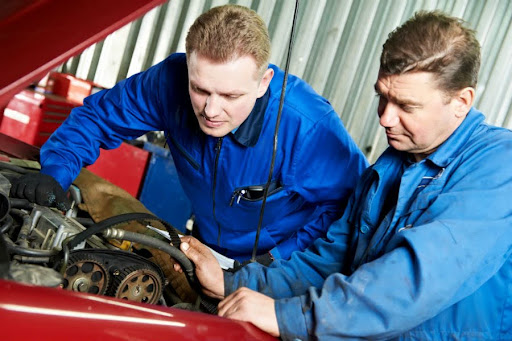Auto Repair Guide to Navigating Auto Repair and Maintenance in Omaha

Navigating auto repair and maintenance can be a daunting task, especially if you're not well-versed in the complexities of vehicle upkeep. However, with the right guidance, you can tackle these tasks with confidence.
In this comprehensive guide, we will walk you through the essential steps and best practices for maintaining your vehicle. From understanding common car issues to basic maintenance tasks, this guide will equip you with the knowledge and skills to keep your vehicle running smoothly, address repairs when needed, and avoid costly service.
Understanding Your Vehicle's Needs
Owning a vehicle comes with the responsibility of understanding and meeting its maintenance and repair needs. Regular maintenance is crucial for the optimal performance and longevity of your car. By staying attuned to your vehicle's requirements, you can address issues before they escalate, saving you both time and money in the long run.
The Importance of Routine Maintenance
Regular maintenance is like taking your vehicle for a routine check-up. Just like visiting the doctor for preventive care, your car needs regular attention to ensure it runs smoothly. Scheduled oil changes, tire rotations, transmission fluid checks, and tune-ups are all part of the maintenance regimen that keeps your vehicle in prime condition. It's the proactive approach to car care that can help prevent major issues and maintain the value of your vehicle.
Signs Your Car Needs Repair
Your vehicle will communicate with you when it needs service, you just need to pay attention. Squeaky brakes, sluggish acceleration, warning lights on the dashboard, strange odors, or unusual noises are all signs that something may be amiss.
It's crucial to be aware of these signals and address them promptly to prevent minor issues from snowballing into costly auto repair needs. Regularly inspecting your vehicle and swiftly addressing any abnormal behavior will help keep your vehicle in good shape.
By understanding and addressing your vehicle's maintenance needs, you ensure its longevity and reliability. Recognizing the signs your vehicle is showing you to indicate it may need repair is an integral part of responsible car ownership.
Finding a Reliable Auto Repair Shop in Omaha
When it comes to finding a reliable Omaha mechanic, the process can seem overwhelming. But, with the right approach, you can ensure that your vehicle is in good hands. Here are some effective strategies to help you find a trustworthy auto repair shop:
Ask for Recommendations
Start by reaching out to family, friends, and colleagues for their recommendations. Personal referrals can provide valuable insights into the quality of service, pricing, and overall customer experience at different auto repair shops. People you trust are likely to steer you in the right direction, helping you narrow down your options based on their positive experiences.
Research Online Reviews
In today's digital age, online reviews are an invaluable resource for assessing the reputation of an auto repair shop. Platforms like Google, Yelp, and Facebook offer insights into the experiences of past customers. Look for patterns in the reviews, paying attention to aspects such as customer service, work quality, pricing transparency, and overall satisfaction. While a few negative reviews are common, consistently positive or negative feedback can be telling.
Visit the Auto Shop First
Before committing to any car mechanic, visit the shop in person. A clean, organized, and well-equipped space often reflects a commitment to professionalism and attention to detail. Take note of the overall vibe and the demeanor of the staff. A welcoming and organized environment can instill confidence in the shop's capabilities to maintain and repair your vehicle.
Ask Questions
During your visit, don't hesitate to ask questions about the shop's experience, certifications, warranties, and specific services they offer. Ask about the qualifications of the mechanics and the use of genuine parts. A reputable shop will be transparent and willing to address your concerns, providing you with the information necessary to make an informed decision about entrusting them with your vehicle.
Navigating Common Auto Repairs
When it comes to navigating auto repairs, understanding the different types of repairs and parts and ensuring that you are on the same page as the mechanic can significantly impact your vehicle's performance and your budget:

The Importance of Understanding Different Types of Repairs
Auto repairs can vary from routine maintenance tasks like oil changes to more complex and extensive repairs such as engine rebuilds. It's crucial to familiarize yourself with at least a basic understanding of the various types of repairs your vehicle may require. By understanding the nature of each repair, you can make informed decisions about the best course of action for your vehicle's maintenance and repair needs.
Deciding Between OEM and Aftermarket Parts
When faced with the need for replacement parts, you'll encounter the choice between original equipment manufacturer (OEM) parts and aftermarket parts. OEM parts are made by the vehicle's manufacturer and are designed to match the exact specifications of the original components.
Alternatively, aftermarket parts are produced by third-party manufacturers. They may offer cost savings and sometimes improved performance. Consider factors such as warranty coverage, quality, and compatibility when deciding between the two types of parts.
Tips for Communicating with Mechanics
Effective communication with the mechanic is essential for ensuring that your vehicle receives the necessary repairs and maintenance. Clearly explain the symptoms or issues you've noticed with your vehicle and provide any relevant details about its history. Ask for a detailed explanation of the diagnosis and proposed repairs, and don't hesitate to seek clarification if something is unclear.
Establishing open and clear lines of communication with your mechanic can lead to a better understanding of the repairs needed and build trust in the process.
Decoding Auto Repair Estimates
Understanding the breakdown of costs is key to avoiding unexpected charges when it comes to auto repair estimates. The estimate should specify the cost of parts, labor, and any additional fees, providing transparency and clarity.
A comprehensive breakdown in an auto repair estimate should include all the parts that need replacement or repair. This breakdown allows you to see exactly what you're paying for and helps in identifying any unnecessary charges. Additionally, understanding the labor costs for each repair can give you insight into the time and effort required for the service.
By grasping these details, you can make informed decisions and ensure that you are not overcharged for the service.
Asking About Warranty and Guarantees
Make sure to Inquire about the warranty and guarantees associated with the parts and labor mentioned in the estimate. Reputable auto repair shops offer warranties on their services and parts, providing you with added assurance. Understanding the warranty and guarantees can give you peace of mind, knowing that the repairs are backed by a commitment to quality and reliability.
By paying attention to the cost breakdown and asking about any warranty coverage, you can navigate auto repair estimates with confidence, ensuring that you receive fair pricing and reliable service.
Making Informed Car Maintenance Decisions
When it comes to taking care of your vehicle, making informed maintenance decisions is crucial. By understanding why it’s so important to follow the vehicle manufacturer's recommendations and knowing which services are essential, you can ensure that your vehicle remains in optimal condition without unnecessary expenses.
The Importance of Following Manufacturer's Recommendations
Manufacturers provide specific guidelines for the maintenance of their vehicles for a reason. These recommendations are tailored to keep your car running smoothly, enhance its longevity, and maintain its resale value. Ignoring these guidelines could lead to performance issues and potential safety hazards. By adhering to the recommendations, you can prevent problems before they arise and save money in the long run.
Differentiating Between Essential and Optional Services
When it comes to car maintenance, it's essential to distinguish between essential and optional services. Essential services, such as oil changes, brake inspections, and tire alignments, are crucial for the proper functioning and safety of your vehicle. On the other hand, optional services, like cosmetic upgrades or performance enhancements, may enhance the driving experience but are not necessary for the basic operation of the vehicle.
By understanding this difference, you can prioritize maintenance tasks and make informed decisions about where to allocate your resources.
By staying informed, you can keep your vehicle well-maintained without unnecessary expenses. Understanding which services are essential empowers you to prioritize maintenance tasks effectively, ensuring the longevity and performance of your vehicle.
Budgeting & Saving for Auto Maintenance and Repairs
Understanding the importance of budgeting for preventive auto maintenance and repairs can save you from financial stress in the long run. When it comes to your vehicle, unexpected expenses can quickly add up. Setting aside a specific amount each month for a vehicle maintenance and repair fund can provide a safety net for unforeseen issues.

This proactive approach helps avoid financial strain and allows for timely repairs, preventing minor issues from escalating into costly problems. Think of it as creating a financial cushion for your vehicle, just like having a rainy day fund for unexpected life events.
DIY Vehicle Maintenance Tips
Checking and Topping Off Fluids
Regularly checking and topping off your vehicle's fluids is vital to ensuring its optimal performance and longevity. Start by locating the engine oil, transmission fluid, brake fluid, coolant, and power steering fluid reservoirs under the hood.
Pull out each dipstick or look for the fluid level markings on the transparent reservoirs to assess the current levels. If any fluid appears low, use the appropriate fluid recommended in your owner's manual to top it off to the specified level. This simple task can help prevent costly repairs and breakdowns.
Changing the Air Filter
The engine air filter is like the lungs of your vehicle, ensuring it breathes clean air for combustion. Over time, the air filter becomes clogged with dirt and debris, hindering airflow to the engine. This can lead to decreased fuel efficiency and engine performance.
To change the air filter, locate the air filter housing, usually found near the front of the engine compartment. Unscrew the clips or fasteners securing the housing, remove the old filter, and insert the new one, ensuring it sits properly. This straightforward maintenance task helps keep your engine running smoothly and efficiently.
Inspecting and Rotating Tires
Regular tire maintenance is essential for safe driving and extending the life of your tires. Start by visually inspecting each tire regularly for signs of uneven wear, damage, or low tread depth. Use a tire pressure gauge to check the air pressure in each tire, comparing it to the recommended pressure in your vehicle's owner’s manual.
Additionally, having the tires rotated at regular intervals promotes even tread wear, prolonging their lifespan. Your vehicle's manual will specify the appropriate tire rotation pattern. By proactively addressing tire issues, you can enhance your vehicle's safety, fuel efficiency, and overall performance.
You Can Count on the Local Auto Repair Experts at T.O. Haas
Navigating auto repair and maintenance can feel overwhelming at first, but with the right guidance and basic knowledge, it becomes manageable. By understanding the importance of regular maintenance, being aware of common vehicle issues, and seeking professional help when needed, you can keep your vehicle running smoothly and avoid costly repairs.
Remember to stay informed about your vehicle's specific needs and to follow the recommended maintenance schedule. With these strategies in place, you can drive with confidence, knowing that your vehicle is in good hands.
If you are searching for a top-quality car mechanic for auto repair in Omaha, look no further than T.O. Haas Tire & Auto. Our ASE-certified experts can meet all of your vehicle’s needs. We offer professional repair, vehicle maintenance, and an unbeatable customer service experience.
Schedule your service appointment at your closest T.O. Haas Tire & Auto location today!
Omaha Auto Repair Service FAQs
What is the most common auto repair?
Mechanics often deal with a wide range of auto repair services daily, but one of the most common services they encounter is brake repair. This usually involves replacing brake pads and calipers, as well as resurfacing or replacing the metal rotors.
Because your brake system experiences normal wear and tear every day, brake repair work usually needs to be done multiple times throughout your vehicle's life. However, incorporating regular brake checks into your vehicle's preventive maintenance routine can help ensure that any minor problems are identified early and fixed before they escalate into the need for more costly repairs.
What do I need to know before going to a mechanic?
There are several key things to keep in mind and specific pieces of information to have on hand before visiting a car mechanic:
- Listen to your vehicle and pinpoint the problem. Pay attention to the sounds, smells, or changes in performance that prompted your visit. Write all of this down. The more details you can give the mechanic when you talk to them, the faster they can diagnose the issue.
- Do your research. Know your car's maintenance schedule and any recent repairs. Gather any relevant paperwork like your service records and owner's manual for the shop's reference. Google the problem to understand basic terminology and avoid feeling overwhelmed once you are at the auto repair shop.
- Get your questions together. Be prepared to ask any questions you may have, and don't hesitate to clarify costs, expected repair times, and alternative options. Your comfort and understanding matter.
- Trust your gut. If something feels off about the shop or mechanic, get a second opinion. Peace of mind is key when entrusting your vehicle.
Does it matter where I get my car serviced?
Yes, it definitely can! While some basic services like oil changes might be similar anywhere, the quality of work and expertise when it comes to more in-depth car repair can vary greatly. Consider factors like:
- Specialization. Does the shop focus on your car's make or model? They might have specific knowledge and parts for your vehicle.
- Reputation. Check online reviews and ask friends for recommendations to find a trustworthy mechanic.
- Cost. Compare prices, but remember, the cheapest option is usually not the best in the long run.
Ultimately, choosing the right place can save you money, time, and headaches in the future. So, do your research and invest in your car's well-being.
How much does it cost to diagnose a car?
Diagnosing car troubles can vary in cost, depending on the depth of testing needed, the shop's labor rates, and even your car's make and model. Expect to pay somewhere between routine maintenance costs and basic repair fees.
To get a more definitive answer, contact the auto repair shop and explain your car's symptoms - they can give an estimated repair cost beforehand.
Are local repair shops cheaper than dealerships?
In most cases, yes! An ASE-certified mechanic at a professional Omaha auto repair shop will be able to provide the same level of service that you would get from a dealership, but, usually at a lower price.
Local auto shops typically have lower overhead, leading to more affordable labor rates and parts. They may also offer alternative parts options, further saving you money.

